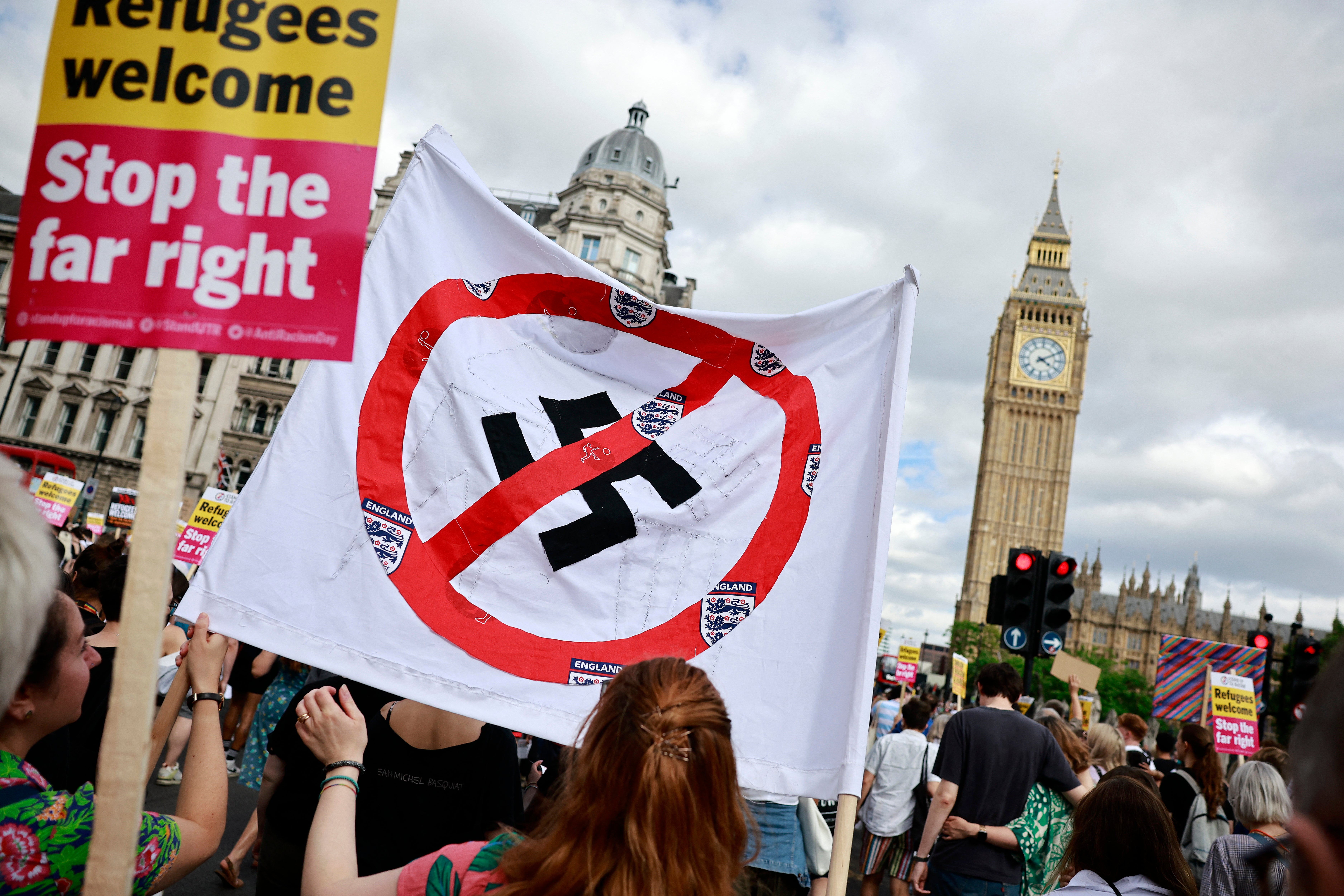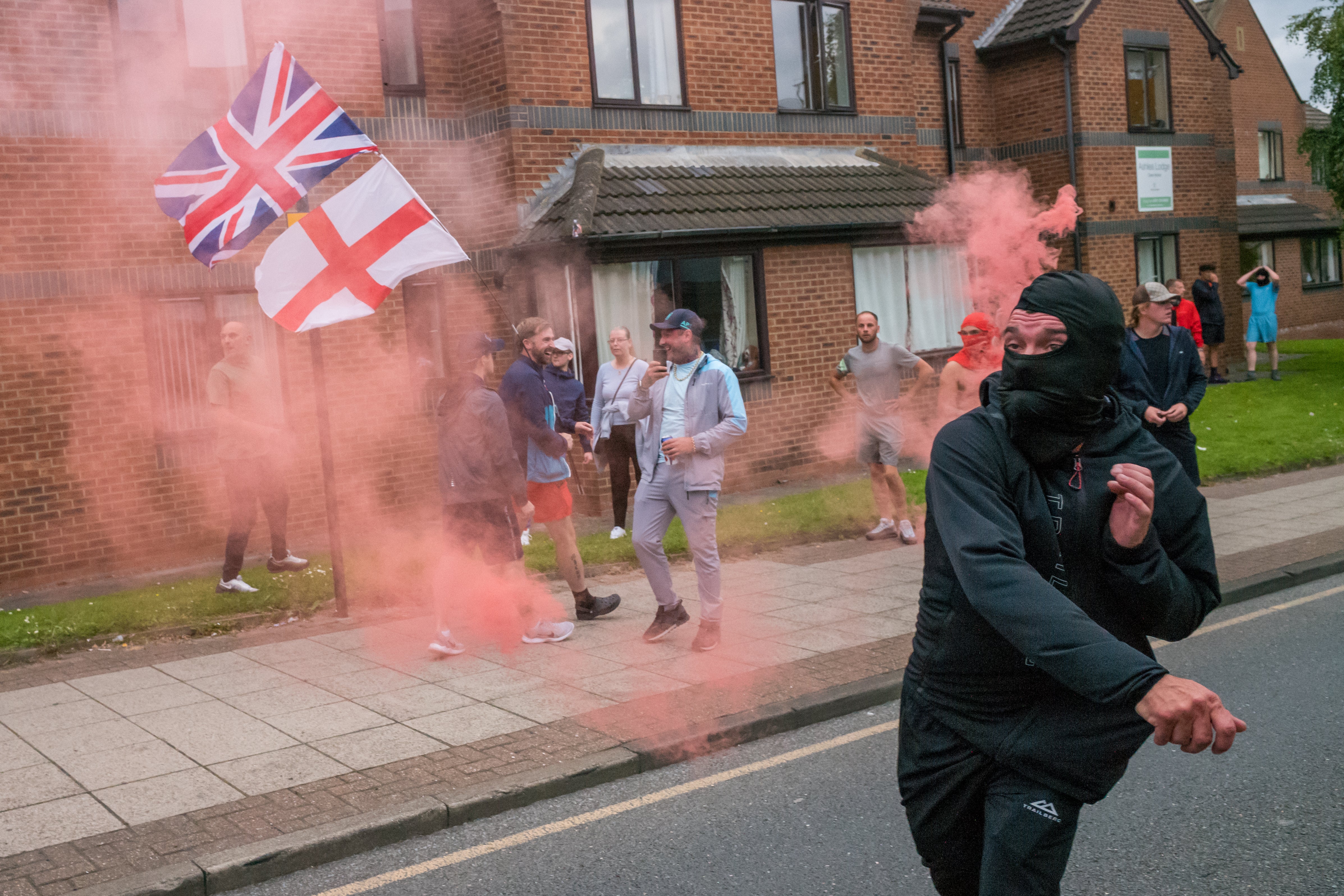Far-right violence caused by UK failure to address institutional racism, campaigners warn
‘People of colour have faced a rowback on their civil and political rights over the past five years,’ UK’s leading racial justice thinktank says

The UK’s failure to address institutional racism is to blame for the recent eruption of far-right violence on the streets, leading campaign groups have said.
A damning new report by prominent global human rights organisation Amnesty International and the UK’s leading racial justice think tank Runnymede Trust exposed a slew of troubling racial disparities.
Rioters have attacked mosques, ambushed riot police, set fire to a hotel housing migrants and torched a public library and Citizens Advice Bureau building in the aftermath of the fatal stabbing of three young girls at a Taylor Swift-themed holiday club in Southport at the end of July.
There have been multiple incidents of ethnic minorities being attacked on the streets. In the aftermath of the Southport stabbing, false information spread rapidly online claiming the suspect was a Muslim asylum seeker who came to the UK on a small boat crossing.
A joint submission from the Runnymede Trust and Amnesty International UK to the UN Committee on the Elimination of Racial Discrimination discovered that government legislation and policy infringes on key articles of the International Convention for the Elimination of Racial Discrimination – a UN treaty.
Campaigners accused successive governments of failing to make sufficient progress on tackling racism as they warned of a ten-year surge in faith-based hate crimes and four-year gridlock on the disparities people of colour grapple with in the criminal justice system, education, health, employment, and immigration.
The study, which has gained the backing of over 40 civil society organisations, found 47 per cent of children of colour are living in poverty, in comparison to 24 per cent of white children.
While police are 6.5 times more likely to subject Black children to strip searches, and 4.7 times more likely to strip search Black adults, than their white counterparts.
It is scandalous that in 2024 people of colour, children included, are facing these levels of poverty and deprivation. These are structural issues, and will need radical solutions to undo them.
Researchers also found Black people are 16 times more likely to be prosecuted, and Asian people 4 times more likely to be prosecuted than their white counterparts under controversial Joint Enterprise laws that effectively enable numerous people to be convicted for one offence.
The study drew attention to the fact British Bangladeshi women are over eight times more likely to be out of work than White British women, while women of colour are three times as likely as white men to be in work that relies on zero-hour contracts.

Alba Kapoor, of the Runnymede Trust, said: “As far-right thugs attack, harass and intimidate people of colour in the UK, there could be no more urgent time to address racial injustice.
“People of colour have faced a rowback on their civil and political rights over the past five years. From the inhumane changes to our asylum system, to the introduction of legislation that restricts protest rights and ramps up harmful policing powers, it is time to shift the dial.”
She said these issues had occurred in tandem with “deep-rooted inequalities” in relation to housing, education and wealth amid the cost of living crisis.
“It is scandalous that in 2024 people of colour, children included, are facing these levels of poverty and deprivation. These are structural issues, and will need radical solutions to undo them,” Ms Kapoor added.
The racist and Islamophobic violence unfolding on the streets of the UK highlight the failures of successive governments to make progress on institutional racism.
Researchers found religious hate crimes against Muslims or those seen to be Muslims make up the greatest proportion of hate crimes. This stands at 44 per cent and is followed by 19 per cent for Jewish people or those assumed to be Jewish.
Among other recommendations, campaigners are calling for the government to get rid of the two-child limit benefit cap, stop the usage of strip searches on children and prohibit the use of rap lyrics and music as evidence in prosecutions.
Ilyas Nagdee, Racial Justice Director at Amnesty, said: “The racist and Islamophobic violence unfolding on the streets of the UK highlight the failures of successive governments to make progress on institutional racism.
“Since the last reporting period, the Committee should be alert to the myriad ways racism and discrimination have been embedded in legislation and policy practice, rather than tackled by successive governments.”
Researchers found people of colour who rent their homes are 87 per cent more likely to have endured illegal acts at the hands of their landlord than White British or Irish renters, as well as being 22 per cent more likely to be exposed to damp or mould in their homes.
A spokesperson for the Home Office and for the Conservative Party has been contacted for comment.
Join our commenting forum
Join thought-provoking conversations, follow other Independent readers and see their replies
Comments
Bookmark popover
Removed from bookmarks